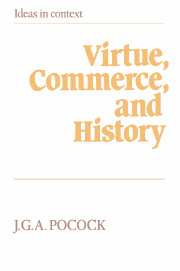 Virtue, Commerce, and History
Virtue, Commerce, and History 3 - Authority and property: The question of liberal origins
Published online by Cambridge University Press: 05 May 2010
Summary
If one sought to characterize the drift of recent historical thinking about the crises of seventeenth-century England, one might well say that it has been in the direction of a heightened awareness of the dialectic between authority and liberty in both the politics and the political thinking of the period. In the field of general history, J. H. Plumb's very important theses of the “growth of stability” and the “growth of oligarchy” have shifted some of our attention away from the first crisis period of 1640–60 and toward the second crisis period of 1680–1720. We now see the latter as culminating in the establishment of that oligarchical, commercial, and imperial Britain against which the American Revolution was directed, but whose problems America in some respects inherited; and the search for the origins of this regime has obliged us to go back to the first crisis period and examine it in terms of restoration as well as of revolution. It does not diminish the radical or the revolutionary character of the things which happened at the beginning and end of the 1640s to say that we cannot understand the revolutionary impulse without also understanding its exhaustion; the study of how revolutions die is a little-known branch of political science. Perhaps the revival of emphasis on this problem reflects the mood of our own society since 1970; whether this is so or not, it is a problem we do well to study.
- Type
- Chapter
- Information
- Virtue, Commerce, and HistoryEssays on Political Thought and History, Chiefly in the Eighteenth Century, pp. 51 - 72Publisher: Cambridge University PressPrint publication year: 1985
- 3
- Cited by
